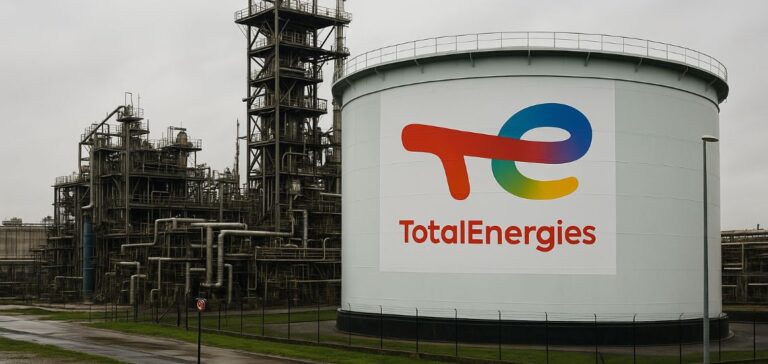TotalEnergies reported a net profit of $3.9bn for the first quarter of 2025, down 33% compared to the same period last year. The French oil and gas group cited an uncertain market environment, notably marked by falling crude prices and refining margins. However, it recorded a nearly 4% rise in hydrocarbon production and an 18% increase in electricity output, supported by acquisitions in the United Kingdom and the United States.
Adjusted net income down 18%
TotalEnergies’ adjusted net income stood at $4.19bn, representing a decrease of 18%. According to the group’s management, this decline was mainly due to the drop in oil prices and persistently weak margins in refining and petrochemicals. Increased hydrocarbon output and higher gas prices helped partially offset the downturn. The company maintained its full-year target of over 3% growth in hydrocarbon production for 2025.
The company confirmed that hydrocarbon production was supported by the launch of new projects and favourable perimeter effects. In terms of electricity, growth was mainly driven by the expansion of renewable capacities and the integration of recently acquired assets in strategic markets.
Persistent volatility and stable investment strategy
TotalEnergies expects a decline in global oil demand in 2025 amid rising geopolitical tensions and tariff measures imposed by the United States. The group noted that oil markets remain volatile, with Brent prices fluctuating between $60 and $70, while refining and petrochemical margins are expected to remain weak.
Despite this context, the company is maintaining its net investment target for 2025, set between $17bn and $17.5bn, of which $4.5bn is allocated to low-carbon energies. TotalEnergies is also continuing its share buyback programme, with a planned envelope of $2bn for the second quarter.
Dividend increase despite a weakened environment
TotalEnergies’ board of directors approved the payment of a first interim dividend of €0.85 per share for the 2025 fiscal year, a 7.6% increase compared to 2024. This decision comes as Brent has remained below the $70 threshold since early April.
“In an environment with prices overall equivalent to the fourth quarter, TotalEnergies delivered solid results in the first quarter,” said Patrick Pouyanné, Chairman and Chief Executive Officer, in a statement released on April 30.






















